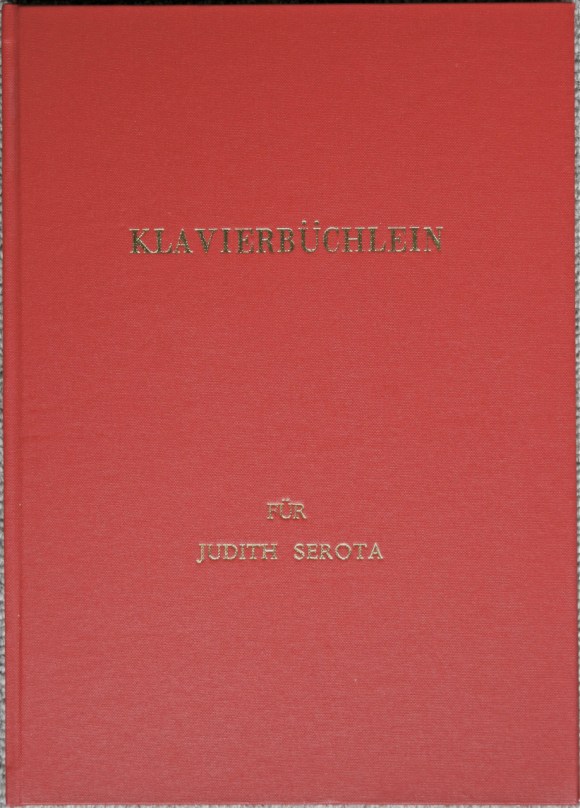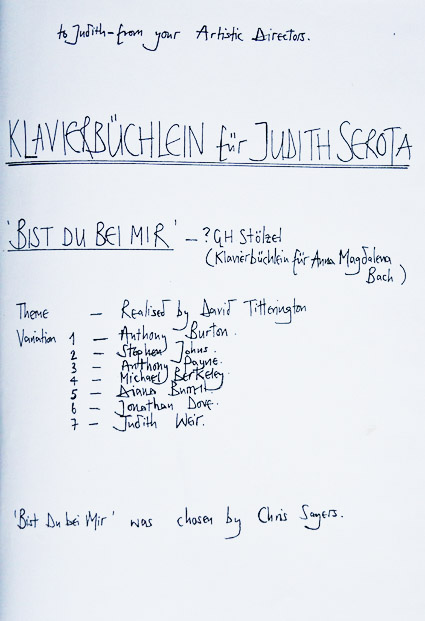

When Judith Serota left the Spitalfields Festival after nearly twenty years at the helm, I felt a very special leaving present was required. There can be few people in the world whose love and enthusiasm for music exceeds Judith’s, and knowing that she had recently become a keen student of the piano, I thought that a specially-written collection of new compositions for herself to play would seem an appropriate gift. I consequently approached* all of the Spitalfields Festival Artistic Directors asking them to write a short variation; Chris Sayers chose the theme and, except for Richard Hickox who – far too modestly perhaps – felt his compositional skills were not up to the task, all of them enthusiastically set about composing pieces for Judith. As the variations began to land on my doormat, I could see that there was the making of a fine collection of eminently playable little gems. David Titterington produced the realisation of the original Stölzel tune immortalised by Bach, I chose an order for the variations and Judith was duly presented with her Klavierbüchlein after an excellent first performance by Andrew Blankfield at her leaving party on 30 November 2007.
Before the publication in 2012, four new variations have been added to the collection bringing the total to eleven. Each is completely individual and all have their composer’s personality shining through. The gift was made for Judith, but I hope it will also provide much joy and inspiration to all pianists who enjoy exploring something fresh and different.
Diana Burrell – Artistic Director, Spitalfields Festival, 2006 – 2009
*copy of email at the bottom of this page
Judith Serota was Executive Director of the Spitalfields Festival (as it then was) for nearly twenty years until late 2007. As a surprise leaving present to her, the then Artistic Director of the Festival, Diana Burrell, conceived the idea of assembling a set of (easy to intermediate) piano pieces for her to play.
These were to be a set of variations. The theme, chosen by Chris Sayers (Guest Artistic Director Summer 1994), was Bist du bei mir, a song for voice and continuo in the second Clavierbüchlein or “Little Keyboard Book” compiled for, and partly by, Bach’s second wife Anna Magdalena. With its text beginning “If thou art with me, then I go gladly to my rest”, this was for many years assumed to be a devotional song by Bach himself. But it is now known to be an aria from the German opera Diomedes by Bach’s contemporary Gottfried Heinrich Stölzel, probably adapted by Bach. The theme was realised by David Titterington, a frequent performer at the Festival.
The variations were written by the Artistic Directors with whom Judith had worked, who according to Festival policy were all composers – with the exception of two non-composer guest directors. In chronological order, they were Michael Berkeley and Anthony Payne (joint Artistic Directors 1995–1997), Judith Weir (joint Artistic Director in the same period and then sole Artistic Director 1998–2000), Stephen Johns (Guest Artistic Director Winter 2000), Anthony Burton (Guest Artistic Director Summer 2001), Jonathan Dove (Artistic Director 2001–2006) and Diana Burrell (Artistic Director 2006–2009). The resulting Klavierbüchlein für Judith Serota was first performed by Andrew Blankfield, a Spitalfields Music trustee, at Judith’s leaving party on 30 November 2007 – to the astonishment and delight of its dedicatee.
Subsequently the project was accepted for publication by the Music Sales Group (now Wise Music Group), and was enlarged by the addition of variations by four distinguished composers associated with the publishing houses of Chester and Novello – some of them with links to the Festival or to Judith Serota herself. They were, in alphabetical order, the late Sir Richard Rodney Bennett and late Sir Peter Maxwell Davies, Thea Musgrave and Tarik O’Regan. Melvyn Tan gave the first performance of the full set, in an order of his devising, on 18 June 2012 in the Spitalfields Music summer festival. It was published the same year under the new title of Variations for Judith, and recorded for NMC Recordings. In 2016, a new variation was added, written by the pianist-composer Rolf Hind at the request of Spitalfields Music for Judith Serota.
Anthony Burton – Guest Artistic Director, Spitalfields Festival, 2009
Track Listing
1 Gottfried Heinrich Stölzel (1690–1749) arranged by Johann Sebastian Bach (1685–1750) Bist du bei mir BWV508 (realised by David Titterington)
2 Stephen Johns (b1964) Bist du bei mir (Spitalfields Echoes)
3 Anthony Payne (1936-2021) Loose Canon for Jude
4 Tarik O’Regan (b1978) Diomedes
5 Judith Weir (b1954) To Judith, from Judith
6 Anthony Burton (b1947) Breaking Away
7 Richard Rodney Bennett (1936–2012) Little Elegy
8 Diana Burrell (b1948) Music for Judith
9 Thea Musgrave (b1928) Prelude
10 Michael Berkeley (b1948) Lullaby
11 Peter Maxwell Davies (1934–2016) Bist du bei mir…oder?
12 Jonathan Dove (b1959) Ist Bach bei mir
Diana Burrell correspondence with original composers for Klavierbuchlein fur Judith Serota
From: Diana Burrell
Subject: Judith’s set of piano variations.
Date: 28 June 2007 at 17:45:37 BST
Dear Tony [Payne], Judith [Weir], Tony [Burton], Stephen [Johns], Michael [Berkeley] and Jonathan [Dove],
Thank you all so much for agreeing to write a tiny variation for piano as a leaving gift for Judith Serota which she can then play.
Chris Sayers suggested some pieces and I decided that ‘Bist du bei mir’ from the Anna Magdelena Book might be suitable as Judith is about Grade 2/3 – ish on the piano and has a great love of music from this period as we all know well. I’ll put a copy of it in the post to each of you tomorrow so that we all have the same version !
Could you all write a very short piece using the Bach in some way – you can be quite liberal in what you take from it, a distant and gentle allusion could be all that’s needed or you can use it in a much more obvious fashion. Your variation can be as short as you like and certainly no longer than the original; a visionary and striking 6-8 bars is better than a dull, rambling five pages….!
Please keep in mind that Judith has not been learning piano for long and is therefore of a fairly elementary standard, so make sure your pieces err on the easy side rather than the other way round as it would be a shame if she wasn’t able to learn them. She is of course musically very sophisticated though.
There will be some sort of leaving party for her in early November and Andrew Blankfield who is on the board and is an excellent pianist has agreed to play all the pieces then. If I am to get the music nicely bound so we can present it to Judith, I think I will need to have everyone’s piece by the end of September. Could you send it to me here rather than the Spitalfields Office as it would be nice to keep it a surprise. Hand-write or computer-set as you prefer, although my preference would be for hand-written pieces as it’s a personal gift.
Have fun !
Diana

